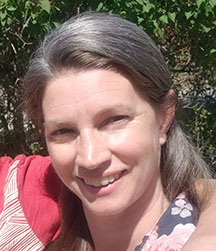Hildegard of Bingen was a nun, medieval mystic, abbess, and prophet who lived from 1098-1179. She experienced visions throughout her life. At the age of 8, she entered a hermitage attached to the Benedictine monastery of Saint Disibod, in the German Rhineland. In 1136, she became abbess of the order. She was granted sainthood in 2010 and also made Doctor of the Church in the Roman Catholic Church in 2012.
Hildegard is unique among women of her time because her mystical visions were preserved in word and image. At the age of 42, having experienced visions throughout her entire life, she was explicitly given a vision where she was told to write down what she saw and heard. She firmly believed herself to be a vessel for God’s revelation to the world and followed this command. With the help of a Benedictine monk, who acted as her scribe, and fellow sisters who helped to illuminate her visions, they have been preserved and passed down to us today.
Hildegard had many visions, 26 detailed experiences written and illuminated in her work “Scivias” and more in “The Book of Divine Works.” These describe salvation history from God’s creation of the world, the fall of Adam and Eve, and the incarnation of the Word through to the end times. She also composed about 150 pieces of liturgical music, some still used today. Hildegard believed that her music was inspired by God through the experience of her visions.
One image from Hildegard that I find of particular interest is her focus on music and the way it reflects the purity of Paradise. She speaks of the pure and glorious singing voice of Adam before the Fall. She wrote, “For, before he sinned, his voice had the sweetness of all musical harmony.” Hildegard understood the pre-Fall conditions of the Garden of Eden to be a place filled with the pure light and joy of God. In an attempt to reflect an aspect of that pure pre-Fall state, her liturgical music included intricate musical arrangements that created sweeping melodies over extended musical ranges.
Why does this matter? German theologian, Dorothee Soelle, argues that we are all mystics. We are all on a journey of encounter and deeper discovery of the experience of the pure love of God. While mysticism was historically reserved for the fortunate few, Soelle believes otherwise. Mysticism, understood as the mutual sharing of longing and love between ourselves and God, is for everyone willing to be open to this experience. The reason to encounter the mystics today, then, is to open ourselves to divine encounters in our everyday lives. Might we allow the mystics to mentor us today in our striving to encounter the Love of God? Democratizing the experience of receiving and sharing the Divine Love of God, perhaps we follow the example of Hildegard of Bingen and engage in the gift of mystical music. I invite you to allow liturgical music to fill us, encircle us, transport us and our voices to an experience of pure joy and Divine Love in Paradise.




